英语常用专有名词
- 格式:doc
- 大小:64.00 KB
- 文档页数:8
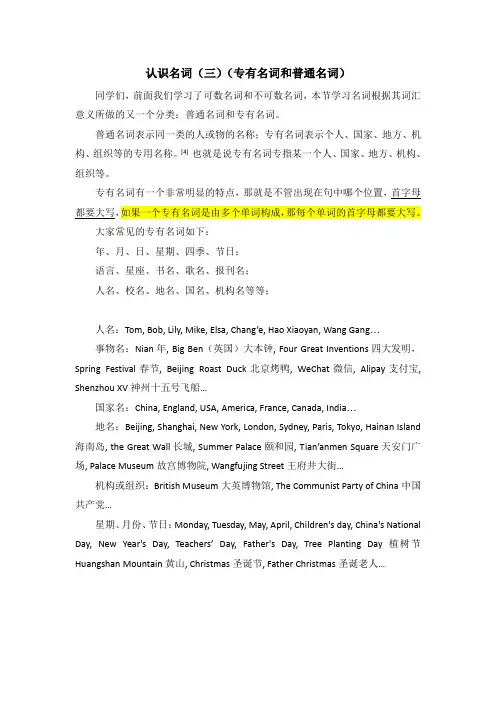
认识名词(三)(专有名词和普通名词)同学们,前面我们学习了可数名词和不可数名词,本节学习名词根据其词汇意义所做的又一个分类:普通名词和专有名词。
普通名词表示同一类的人或物的名称;专有名词表示个人、国家、地方、机构、组织等的专用名称。
[4] 也就是说专有名词专指某一个人、国家、地方、机构、组织等。
专有名词有一个非常明显的特点,那就是不管出现在句中哪个位置,首字母都要大写,如果一个专有名词是由多个单词构成,那每个单词的首字母都要大写。
大家常见的专有名词如下:年、月、日、星期、四季、节日;语言、星座、书名、歌名、报刊名;人名、校名、地名、国名、机构名等等;人名:Tom, Bob, Lily, Mike, Elsa, Chang’e, Hao Xiaoyan, Wang Gang…事物名:Nian年, Big Ben(英国)大本钟, Four Great Inventions四大发明,Spring Festival春节, Beijing Roast Duck北京烤鸭, WeChat微信, Alipay支付宝, Shenzhou XV神州十五号飞船…国家名:China, England, USA, America, France, Canada, India…地名:Beijing, Shanghai, New York, London, Sydney, Paris, Tokyo, Hainan Island 海南岛, the Great Wall长城, Summer Palace颐和园, Tian’anmen Square天安门广场, Palace Museum故宫博物院, Wangfujing Street王府井大街…机构或组织:British Museum大英博物馆, The Communist Party of China中国共产党…星期、月份、节日:Monday, Tuesday, May, April, Children's day, China's National Day, New Year's Day, Teachers’Day, Father's Day, Tree Planting Day植树节Huangshan Mountain黄山, Christmas圣诞节, Father Christmas圣诞老人…。
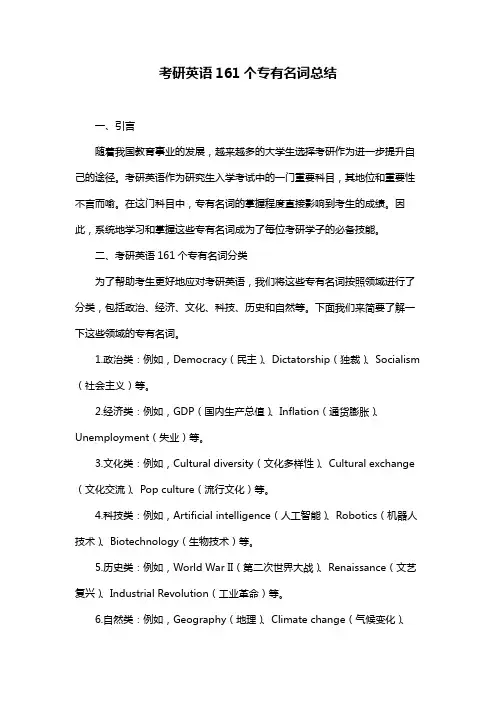
考研英语161个专有名词总结一、引言随着我国教育事业的发展,越来越多的大学生选择考研作为进一步提升自己的途径。
考研英语作为研究生入学考试中的一门重要科目,其地位和重要性不言而喻。
在这门科目中,专有名词的掌握程度直接影响到考生的成绩。
因此,系统地学习和掌握这些专有名词成为了每位考研学子的必备技能。
二、考研英语161个专有名词分类为了帮助考生更好地应对考研英语,我们将这些专有名词按照领域进行了分类,包括政治、经济、文化、科技、历史和自然等。
下面我们来简要了解一下这些领域的专有名词。
1.政治类:例如,Democracy(民主)、Dictatorship(独裁)、Socialism (社会主义)等。
2.经济类:例如,GDP(国内生产总值)、Inflation(通货膨胀)、Unemployment(失业)等。
3.文化类:例如,Cultural diversity(文化多样性)、Cultural exchange (文化交流)、Pop culture(流行文化)等。
4.科技类:例如,Artificial intelligence(人工智能)、Robotics(机器人技术)、Biotechnology(生物技术)等。
5.历史类:例如,World War II(第二次世界大战)、Renaissance(文艺复兴)、Industrial Revolution(工业革命)等。
6.自然类:例如,Geography(地理)、Climate change(气候变化)、Ecology(生态学)等。
三、学习策略与方法面对如此庞大的专有名词体系,考生该如何学习呢?以下是一些建议:1.词汇记忆技巧:a.联想记忆:将专有名词与生活中的实际事物、人物等进行联想,从而加深记忆。
b.词根词缀记忆:了解词根词缀的含义和规律,有助于更好地理解和记忆专有名词。
c.语境记忆:在学习和运用专有名词时,尽量阅读相关文章和句子,将词汇置于实际语境中记忆。
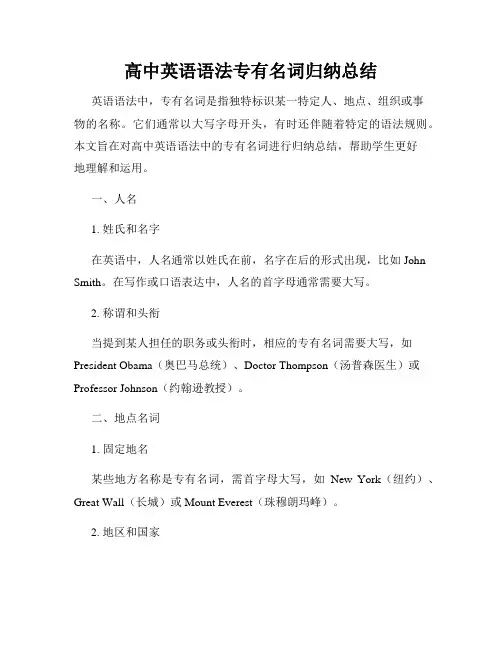
高中英语语法专有名词归纳总结英语语法中,专有名词是指独特标识某一特定人、地点、组织或事物的名称。
它们通常以大写字母开头,有时还伴随着特定的语法规则。
本文旨在对高中英语语法中的专有名词进行归纳总结,帮助学生更好地理解和运用。
一、人名1. 姓氏和名字在英语中,人名通常以姓氏在前,名字在后的形式出现,比如John Smith。
在写作或口语表达中,人名的首字母通常需要大写。
2. 称谓和头衔当提到某人担任的职务或头衔时,相应的专有名词需要大写,如President Obama(奥巴马总统)、Doctor Thompson(汤普森医生)或Professor Johnson(约翰逊教授)。
二、地点名词1. 固定地名某些地方名称是专有名词,需首字母大写,如New York(纽约)、Great Wall(长城)或Mount Everest(珠穆朗玛峰)。
2. 地区和国家当提到特定地区或国家时,该名称的首字母需要大写,如Asia(亚洲)、France(法国)或Tokyo(东京)。
三、组织机构名词1. 公司和机构当提到具体的公司或机构时,其名称的首字母需要大写,如Microsoft(微软)、United Nations(联合国)或Harvard University (哈佛大学)。
2. 学校和班级学校、大学以及班级名称也属于专有名词。
类似于Harvard University的例子,还有高中里的某个具体班级,如Class 10A或St. Mary's School。
四、品牌和产品名称某些品牌和产品具有独特的名称,需要以大写字母开头,如Apple (苹果)、Coca-Cola(可口可乐)或Nike(耐克)。
五、事件和节日名称特定的事件、历史时期或节日也属于专有名词,如World War II (第二次世界大战)、Christmas(圣诞节)或Easter(复活节)。
六、专业术语在特定领域中,一些专业术语也被视为专有名词。
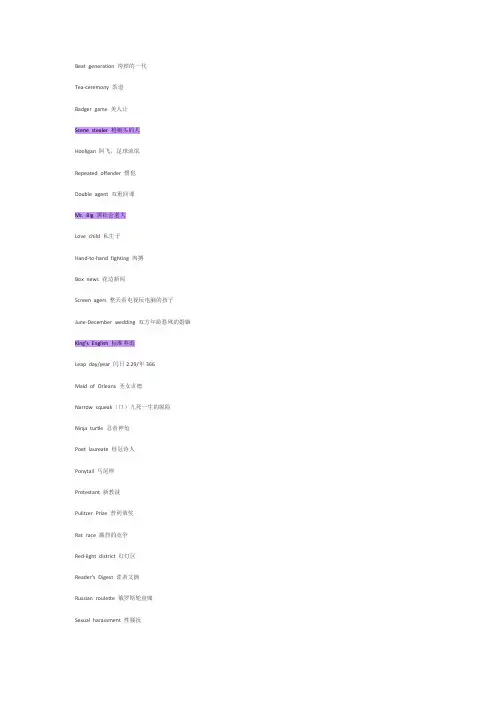
Beat gen eration 垮掉的一代Tea-ceremon y 茶道Badger game 美人计Scene stealer 抢镜头的人Hooligan 阿飞,足球流氓Repeated offender 惯犯Double agent 双重间谍Mr. Big 黑社会老大Love child 私生子Hand-to-hand fighting 肉搏Box news 花边新闻Screen agers 整天看电视玩电脑的孩子June-December wedding 双方年龄悬殊的婚姻King’s English 标准英语Leap day/year 闰日2.29/年366Maid of Orleans 圣女贞德Narro w squeak(口)九死一生的脱险Ninja turtle 忍者神龟Poet laureate 桂冠诗人Ponytail 马尾辫Protestant 新教徒Pulitzer Prize 普利策奖Rat rac e 激烈的竞争Red-light district 红灯区Read er’s Digest 读者文摘Russian roulette 俄罗斯轮盘赌Sexual harassment 性骚扰Short fuse 易怒的脾气Soft-soap 奉承讨好Silent contribution 隐名捐款Silly mon ey 来路不明的钱Silver screen 银幕,电影界Summer complaint 夏季病,拉肚子Tenth-rate 最低等的,劣等的Vertic al/lateral thinking 纵向,横向思维Wide-body 大部头的作品Wheel of life (佛教)轮回Xenomania 媚外Yearbook 年鉴年刊Zen 禅Paparazzi 狗仔队Show people 娱乐界人士Exotic dance 脱衣舞Bearish 行情下跌的Bullish 行情上涨的State prisoner 政治犯Stowaway 偷渡者,逃票的乘客Plainclothesman 便衣警察Police dog 警犬Police post 派出所Negligent homicide 过失杀人Impostor 江湖骗子ICJ Intern ational Court of Justice 国际法院Espionage 间谍间谍活动Lifer 职业军人Mine 地雷水雷Panzer 装甲车坦克Off limits 军事禁区Q-boat 伪装成商船或渔船的武装船只Riot corps 防暴部队Standing army 常规军Sniper 狙击手Bermud a Triangle 百慕大三角洲Brain drain 脑力人才外流Brawn drain 劳力外流Break- dancing 霹雳舞French windo ws 落地窗Funeral home 殡仪馆Taillight 车尾灯Visiting team 客队Runner-up 亚军Black ref eree 黑哨Foul play 犯规动作Standing broad ju mp 立定跳远Underachiever 差等生Hothouse 对儿童进行学前教育Whiz kid 神童优等生Newsbreak 重要新闻Needle trade 成衣业Massage parlour 挂按摩牌子的妓院Moonlight 作动词,干第二职业Mixed marriage 异族通婚Moon roof 汽车的顶窗Eggh ead 对知识分子的蔑称Dog days 七八月份的酷暑期,伏天Connoisseur 鉴赏家Box office 票房Bridesmaid 女傧相Bee (美)为互助友好而举行的聚会Bigtime 红极一时的,赫赫有名的Bank of issue 发行银行Cater ∏ 美国总统克林顿(卡特二世。
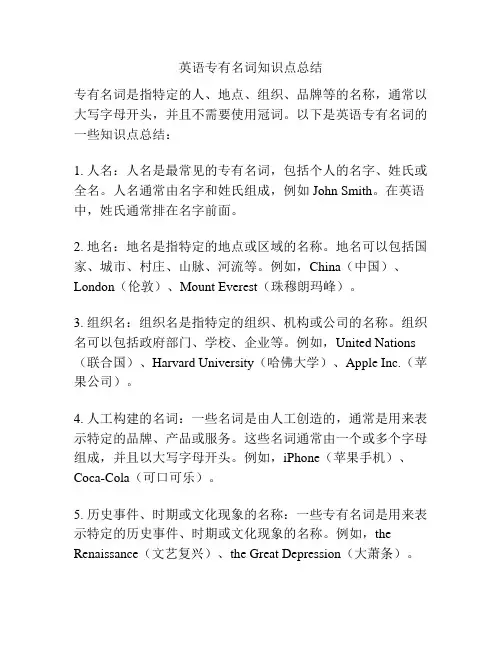
英语专有名词知识点总结
专有名词是指特定的人、地点、组织、品牌等的名称,通常以大写字母开头,并且不需要使用冠词。
以下是英语专有名词的一些知识点总结:
1. 人名:人名是最常见的专有名词,包括个人的名字、姓氏或全名。
人名通常由名字和姓氏组成,例如John Smith。
在英语中,姓氏通常排在名字前面。
2. 地名:地名是指特定的地点或区域的名称。
地名可以包括国家、城市、村庄、山脉、河流等。
例如,China(中国)、London(伦敦)、Mount Everest(珠穆朗玛峰)。
3. 组织名:组织名是指特定的组织、机构或公司的名称。
组织名可以包括政府部门、学校、企业等。
例如,United Nations (联合国)、Harvard University(哈佛大学)、Apple Inc.(苹果公司)。
4. 人工构建的名词:一些名词是由人工创造的,通常是用来表示特定的品牌、产品或服务。
这些名词通常由一个或多个字母组成,并且以大写字母开头。
例如,iPhone(苹果手机)、Coca-Cola(可口可乐)。
5. 历史事件、时期或文化现象的名称:一些专有名词是用来表示特定的历史事件、时期或文化现象的名称。
例如,the Renaissance(文艺复兴)、the Great Depression(大萧条)。
需要注意的是,专有名词是指特定的人、地点、组织等的名称,因此在使用时应该始终以大写字母开头,并且不需要使用冠词。
例如,正确的写法是London(伦敦),而不是the London。
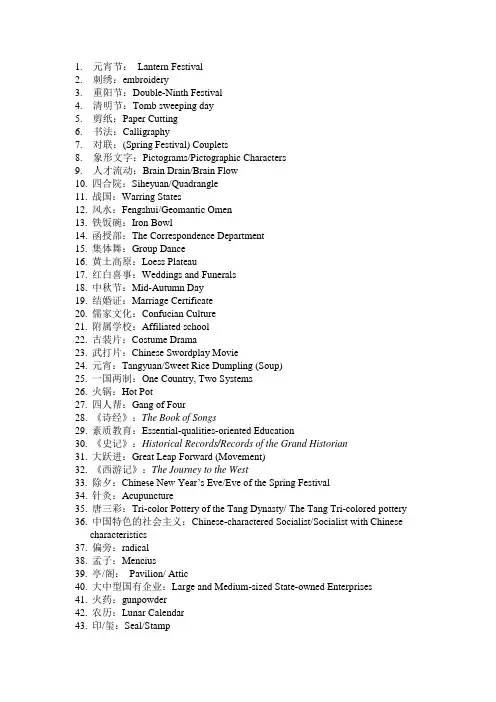
1.元宵节:Lantern Festival2.刺绣:embroidery3.重阳节:Double-Ninth Festival4.清明节:Tomb sweeping day5.剪纸:Paper Cutting6.书法:Calligraphy7.对联:(Spring Festival) Couplets8.象形文字:Pictograms/Pictographic Characters9.人才流动:Brain Drain/Brain Flow10.四合院:Siheyuan/Quadrangle11.战国:Warring States12.风水:Fengshui/Geomantic Omen13.铁饭碗:Iron Bowl14.函授部:The Correspondence Department15.集体舞:Group Dance16.黄土高原:Loess Plateau17.红白喜事:Weddings and Funerals18.中秋节:Mid-Autumn Day19.结婚证:Marriage Certificate20.儒家文化:Confucian Culture21.附属学校:Affiliated school22.古装片:Costume Drama23.武打片:Chinese Swordplay Movie24.元宵:Tangyuan/Sweet Rice Dumpling (Soup)25.一国两制:One Country, Two Systems26.火锅:Hot Pot27.四人帮:Gang of Four28.《诗经》:The Book of Songs29.素质教育:Essential-qualities-oriented Education30.《史记》:Historical Records/Records of the Grand Historian31.大跃进:Great Leap Forward (Movement)32.《西游记》:The Journey to the West33.除夕:Chinese New Year’s Eve/Eve of the Spring Festival34.针灸:Acupuncture35.唐三彩:Tri-color Pottery of the Tang Dynasty/The Tang Tri-colored pottery36.中国特色的社会主义:Chinese-charactered Socialist/Socialist with Chinesecharacteristics37.偏旁:radical38.孟子:Mencius39.亭/阁:Pavilion/ Attic40.大中型国有企业:Large and Medium-sized State-owned Enterprises41.火药:gunpowder42.农历:Lunar Calendar43.印/玺:Seal/Stamp44.物质精神文明建设:The Construction of Material Civilization and SpiritualCivilization45.京剧:Beijing Opera/Peking Opera46.秦腔:Crying of Qin People/Qin Opera47.太极拳:Tai Chi48.独生子女证:The Certificate of One-child49.天坛:Altar of Heaven in Beijing50.小吃摊:Snack Bar/Snack Stand51.红双喜:Double Happiness52.政治辅导员:Political Counselor/School Counselor53.春卷:Spring Roll(s)54.莲藕:Lotus Root55.追星族:Star Struck56.故宫博物院:The Palace Museum57.相声:Cross-talk/Comic Dialogue58.下岗:Lay off/Laid off59.北京烤鸭:Beijing Roast Duck60.高等自学考试:Self-taught Examination of Higher Education61.烟花爆竹:fireworks and firecracker62.敦煌莫高窟:Mogao Caves63.电视小品:TV Sketch/TV Skit64.香港澳门同胞:Compatriots from Hong Kong and Macao65.文化大革命:Cultural Revolution66.长江中下游地区:The Mid-low Reaches of Yangtze River67.门当户对:Perfect Match/Exact Match68.《水浒》:Water Margin/Outlaws of the Marsh69.中外合资企业:Joint Ventures70.文房四宝(笔墨纸砚):"The Four Treasure of the Study" "Brush, Inkstick, Paper,and Inkstone",2010年上海世博会 Expo 2010 Shanghai China世博会会徽 Expo emblem世博会徽标 Expo Logo世博会吉祥物 Expo Mascot世博会纪念品 Expo Souvenir世博园 Expo Park世博会主题 Expo theme世博园区 the Expo Site主题馆 the theme pavilions国际馆 International Pavilion主题馆 Theme Pavilion企业馆 Enterprise Pavilion中国馆 China Pavilion世博会村 the Expo Village世博中心 the Expo Center世博餐饮中心 Expo Dining Center专题讨论会 symposium志愿者 volunteers城市,让生活更美好 Better city, better life. 公共服务 public service信息中心 the Information Center服务中心 the Service Center急救中心 the Emergency Center世博急救中心 Expo First-aid Center国际会议中心 International Convention Center 金融贸易区 Finance and Trade Zone保税区 free Trade Zone故居 Former Residence of影城 Film Art Center市中心 downtown志愿者 volunteers黄浦江 the Huangpu River商厦 Commercial Building地标 landmark路标 the road sign公共交通 public transport红绿灯 traffic lights轻轨站 the light rail station过江隧道 tunnels under the river轮渡 ferry专线大巴 the shuttle bus园内巴士 the on-site bus518路公共汽车站 No.518bus stop地铁站 a metro station地铁8号线 Metro Line 8停车场 the parking lot叫辆出租车 hail a taxi停车 par k one’s car旅游景点 tourist attractions游客 tourist导游 guide入口处 entrance外滩 the Bund豫园 the Yu Garden东方明珠 the Oriental Pearl Tower上海大剧院 Shanghai Grand Theatre金茂大厦 Jinmao Tower世纪大道 Century Boulevard夜游 night tour不夜城 sleepless city沧海桑田 ups and downs of time长江三角洲 the Yangtze River Delta磁悬浮列车 maglev train (magnetically levitated train); magnetic suspension train大都市 metropolis; cosmopolis; metropolitan city; cosmopolitan city 东方明珠塔Oriental Pearl TV Tower东海之滨的明珠 the pearl on the coast of the East China Sea国际展览局 BIE International Bureau of Exhibitions龙华寺 Longhua Temple外滩 the Bund信息港 infoport黄浦江游cruise along the Huangpu River玉佛寺 Jade Buddha Temple豫园 Yu Yuan Garden金贸大厦 Jinmao Tower城隍庙Town God’s Temple上海国际会议中心 Shanghai International Convention Center(南浦,杨浦,徐浦,卢浦)大桥 Nanpu/ Yangpu/ xupu/ lupu (suspension) Bridge (浦东)滨江大道 Riverside Promenade外滩观隧道 Sightseeing Tunnel at the Bund(浦东) 世纪公园 Century Park上海体育馆Shanghai Stadium上海大剧院 Shanghai Grand Theater上海科技馆 Shanghai Science & Technology Museum虹口足球场 Shanghai Hongkou Football Stadium上海植物园Shanghai Botanical Garden水族馆 aquariumPeace Hotel 和平饭店Holliday Inn 假日酒店Pudong Shangri-la 香格里拉Renaissance shanghai Pudong 上海淳大万丽Portman Ritz-Carlton 波特曼丽嘉酒店the Grand Hyatt 金贸凯悦Hilton Shanghai 希尔顿Four Seasons 四季大酒店Equatorial Shanghai 赤道大酒店Regal International East Asia 富豪Marriott 万豪Radisson 雷迪森、瑞迪森Sheraton 喜来登Ramada 华美达Inter-Continental 洲际Sofitel Hyland 索菲特Westin 威斯汀St. Regis 瑞吉。
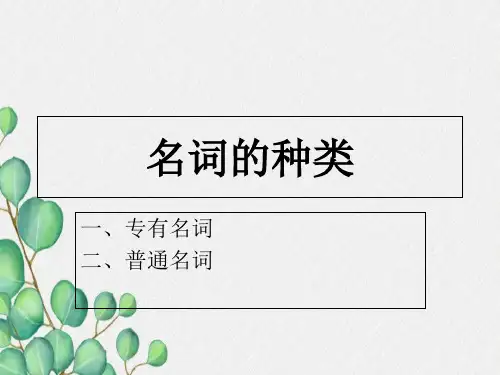
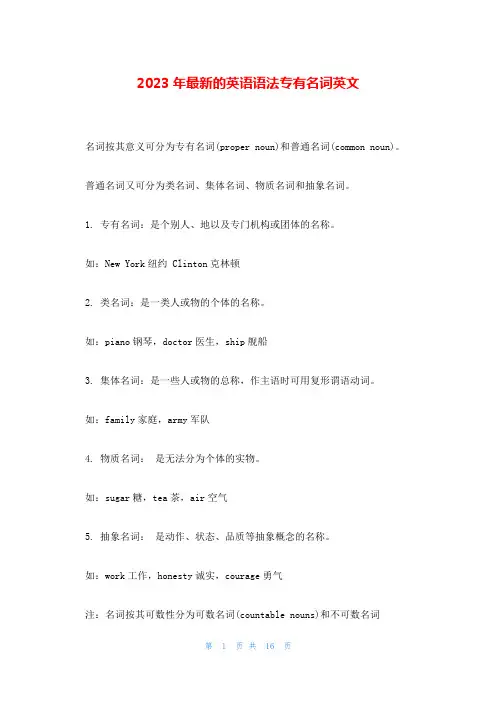
2023年最新的英语语法专有名词英文名词按其意义可分为专有名词(proper noun)和普通名词(common noun)。
普通名词又可分为类名词、集体名词、物质名词和抽象名词。
1. 专有名词:是个别人、地以及专门机构或团体的名称。
如:New York纽约 Clinton克林顿2. 类名词:是一类人或物的个体的名称。
如:piano钢琴,doctor医生,ship舰船3. 集体名词:是一些人或物的总称,作主语时可用复形谓语动词。
如:family家庭,army军队4. 物质名词:是无法分为个体的实物。
如:sugar糖,tea茶,air空气5. 抽象名词:是动作、状态、品质等抽象概念的名称。
如:work工作,honesty诚实,courage勇气注:名词按其可数性分为可数名词(countable nouns)和不可数名词(uncountable nouns)。
类名词皆可数,集体名词大都可数,专有名词、物质名词和抽象名词多不可数。
名词的复数形式1. 规则变化:1)一般加-s如:map------maps地图 field------fields田地2)以s, x, sh, ch 结尾的名词后加-es如:class---classes班,box---boxes盒子 dish---dishes盘子, match---matches比赛3)以 f 或 fe 结尾的名词,变为-ves如:leaf---leaves叶 thief---thieves贼(注:下列词例外:roofs屋顶,gulfs海湾, belief信仰,信条)4)以辅音字母 y 结尾,变y为i,再加-es如:party---parties党 factory---factories工厂(注:元音字母 y 结尾直接加-s: boys男孩 rays光线)5)以辅音字母 o 结尾,一般加-es如:potato---potatoes 马铃薯 hero---heroes 英雄(注:某些外来词以及以元音字母 o结尾的名词,直接加-s: pianos钢琴,photos照片,kilos公斤;radios收音机2. 不规则变化1)变内部元音。
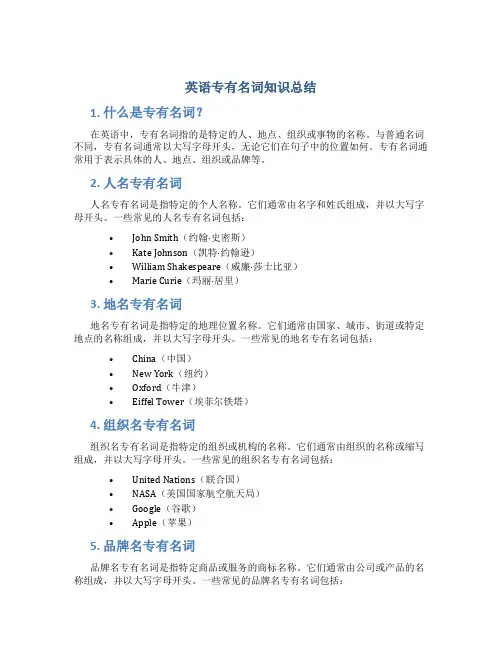
英语专有名词知识总结1. 什么是专有名词?在英语中,专有名词指的是特定的人、地点、组织或事物的名称。
与普通名词不同,专有名词通常以大写字母开头,无论它们在句子中的位置如何。
专有名词通常用于表示具体的人、地点、组织或品牌等。
2. 人名专有名词人名专有名词是指特定的个人名称。
它们通常由名字和姓氏组成,并以大写字母开头。
一些常见的人名专有名词包括:•John Smith(约翰·史密斯)•Kate Johnson(凯特·约翰逊)•William Shakespeare(威廉·莎士比亚)•Marie Curie(玛丽·居里)3. 地名专有名词地名专有名词是指特定的地理位置名称。
它们通常由国家、城市、街道或特定地点的名称组成,并以大写字母开头。
一些常见的地名专有名词包括:•China(中国)•New York(纽约)•Oxford(牛津)•Eiffel Tower(埃菲尔铁塔)4. 组织名专有名词组织名专有名词是指特定的组织或机构的名称。
它们通常由组织的名称或缩写组成,并以大写字母开头。
一些常见的组织名专有名词包括:•United Nations(联合国)•NASA(美国国家航空航天局)•Google(谷歌)•Apple(苹果)5. 品牌名专有名词品牌名专有名词是指特定商品或服务的商标名称。
它们通常由公司或产品的名称组成,并以大写字母开头。
一些常见的品牌名专有名词包括:•Coca-Cola(可口可乐)•Nike(耐克)•Microsoft(微软)•Mercedes-Benz(奔驰)6. 总结英语专有名词是表示特定个人、地点、组织或品牌的名称。
它们通常以大写字母开头,与普通名词有所区别。
在使用英语时,正确使用专有名词是非常重要的,可以通过注意大写字母的使用来正确地表达特定的个人、地点、组织或品牌。
熟悉常见的专有名词可以帮助我们更好地理解英语文章和对话。
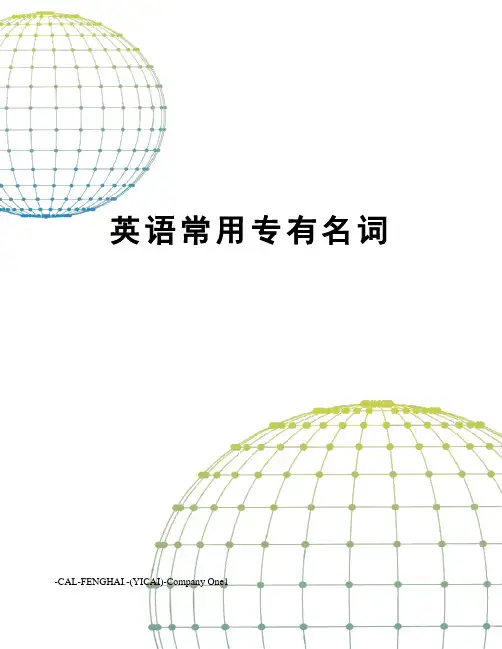
英语常用专有名词-CAL-FENGHAI.-(YICAI)-Company One1(一)第一部分:中华文明 Chinese civilization[sivilai`zeiʃən]文明摇篮 cradle of civilization华夏祖先 the Chinese ancestors秦始皇帝 First Emperor, Emperor Chin皇太后 Empress Dowager汉高祖刘邦 founder of the Han Dynasty (206BC-220AD)成吉思汗 Genghis Khan ; Temujin夏朝 Xia Dynasty明清两代 (of) Ming and Qing dynasties地名:特别注意四川和陕西拼法四川 Sichuan, Szechwan, Szechuan陝西 Shaanxi四大发明 the four great inventions of ancientChina火药 gunpowder印刷术 printing造纸术 paper-making指南针 the compass汉字 Chinese character单音节 single syllable汉语四声调 the four tones of Chinese characters阳平 level tone阴平 rising tone上声 falling-rising tone去声 falling tone四书 the Four Books《大学》 The Great Learning《中庸》 The Doctrine of the Mean《论语》 The Analects of Confucius《孟子》 The Mencius《春秋》 the Spring and Autumn Annals《史记》 Historical Records《诗经》 The Books of Songs; The Book of Odes《书经》 The Books of History《易经》 I Ching; The Book of Changes《礼记》 The Book of Rites《孝经》 Book of Filial Piety《孙子兵法》 The Art of War《三字经》 The Three-Character Scripture; The Three-Word Chant 《三国演义》 Three Kingdoms《西游记》 Journey to the West; Pilgrimage to the West《红楼梦》 Dream of the Red Mansions《山海经》 The Classic of Mountains and Rivers《资治通鉴》 History as a Mirror; Comprehensive History Retold as a Mirror for Rulers《西厢记》 The Romance of West Chamber《水浒传》 Heroes of the Marshes; Tales of the Water Margin《聊斋志异》 Strange Tales of a Lonely Studio; Strange Tales from Make-Do Studio《围城》 Fortress Besieged《阿Q正传》 The True Story of Ah Q五言绝句 five-character quatrain七言律诗 seven-character octave八股文 eight-part essay; stereotyped writing重要文化遗产 major cultural heritage优秀民间艺术 outstanding folk arts文物 cultural relics中国画 traditional Chinese painting书法 calligraphy水墨画 Chinese brush painting; ink and wash painting工笔 traditional Chinese realistic painting中国结 Chinese knot旗袍 Cheongsam中山装 Chinese tunicsuit唐装 traditional Chinese garments (clothing); Tang suit朝廷使者 royal court envoy文人 men of letters雅士 refined scholars表演艺术 performing art现代流行艺术 popular art, pop art纯艺术 high art高雅艺术 refined art电影艺术 cinematographic art戏剧艺术 theatrical art才子佳人 gifted scholars and beautiful ladies生 (男性正面角色) male (the positive male role)旦 (女性正面角色) female (the positive female role)净 (性格鲜明的男性配角) a supporting male role with striking character丑 (幽默滑稽或反面角色) a clown or a negative role花脸 painted role歌舞喜剧 musical滑稽场面, 搞笑小噱头 shtick滑稽短剧 skit京剧人物脸谱 Peking Opera Mask皮影戏 shadow play; leather-silhouette show说书 story-telling叠罗汉 make a human pyramid折子戏 opera highlights踩高跷 stilt walk哑剧 pantomime; mime哑剧演员 pantomimist戏剧小品 skit马戏 circus show单口相声 monologue comic talk, standup comedy特技表演 stunt相声 witty dialogue comedy, comic cross talk杂技 acrobatics京韵大鼓 the traditional story-telling in Beijing dialect with drumaccompaniment秦腔 Shaanxi opera武术 martial art功夫 kung fu武术门派 styles or schools of martial art习武健身 practice martial art for fitness气功 qigong, deep breathing exercises拳击 boxing篆刻seal cutting upriteous工艺, 手艺 workmanship / craftsmanship卷轴 scroll蜡染 batik泥人 clay figure漆画 lacquer painting唐三彩 Trio-colored glazedpotteryof the Tang Dynasty景泰蓝 cloisonné文房四宝 The four stationery treasures of the Chinese study --- a writing brush, an ink stick, an ink stone and paper民间传说 folklores寓言 fable传说 legend神话 mythology古为今用,洋为中用 make the past serve the present and the foreign serve china赋诗 inscribe a poem对对联 matching an antithetical couplet阳历 solar calendar公历 Gregorian calendar阴历 lunar calendar天干 heavenly stem地支 earthly branch闰年 leapyear二十四节气 the twenty-four solar terms十二生肖 the twelve Chinese zodiacsigns本命年 one's year of birth considered in relation to the 12 TerrestrialBranches 传统节日 traditional holidays春节 the Spring Festival元宵节 the Lantern Festival (15th day of the first lunar month)清明节 the Pure Brightness Festival / the Tomb-sweeping Day (April the 5th)端午节 the Dragon Boat Festival (5th of the fifth lunar month)中秋节 the Moon Festival / the Mid-Autumn Day (15th of the eight lunar month)重阳节 the Double Ninth Day / the Aged Day(二)第二部分:缩写词CIA--Central Intelligence Agency中央情报局ABC—American Broadcasting Corporation[kɔ:pə·reɪʃn]美国广播公司CCTV--China Central TelevisionFBI--Federal Bureau ['bjʊərəʊ] of Investigation联邦调查局NSA--National ['næʃnəl] Security [sɪ'kjʊərətɪ] Agency 国家安全局NASA--National Aeronautics [eərə`nɔ:tɪks] and Space Administration国家航空航天局APEC--Asian-Pacific[`eɪʃn] Economic [i:kə`nɒmɪk] Cooperation [kəʊɒpə`reɪʃn]亚太经济合作组织ATM--Automatic[`ɔ:tə'mætɪk] Teller['telə(r)] machine自动取款机BBS--Bulletin['bʊlətɪn] Board System电子公告板CEO--Chief[tʃi:f] Executive[ɪɡ'zekjətɪv] Officer首席执行官CFO--Chief Financial[faɪ`nænʃl] Officer 首席财务官CPI--Consumer Price Index全国居民消费价格指数CPU--Central Processing Unit微处理器GDP--Gross Domestic[də`mestɪk] Product国内生产总值GNP--Gross National ['næʃnəl] Product国民生产总值GPS--Global Position System全球定位系统OTC--Over the Counter非处方药SUV--Sport-utility[ju:`tɪləti] vehicle 多用途跑车。
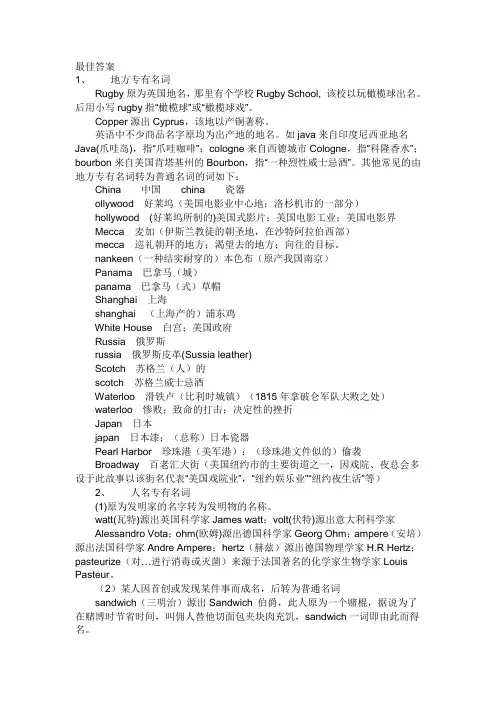
最佳答案1、地方专有名词Rugby原为英国地名,那里有个学校Rugby School, 该校以玩橄榄球出名。
后用小写rugby指“橄榄球”或“橄榄球戏”。
Copper源出Cyprus,该地以产铜著称。
英语中不少商品名字原均为出产地的地名。
如java来自印度尼西亚地名Java(爪哇岛),指“爪哇咖啡”;cologne来自西德城市Cologne,指“科隆香水”;bourbon来自美国肯塔基州的Bourbon,指“一种烈性威士忌酒”。
其他常见的由地方专有名词转为普通名词的词如下:China 中国china 瓷器ollywood 好莱坞(美国电影业中心地;洛杉机市的一部分)hollywood (好莱坞所制的)美国式影片;美国电影工业;美国电影界Mecca 麦加(伊斯兰教徒的朝圣地,在沙特阿拉伯西部)mecca 巡礼朝拜的地方;渴望去的地方;向往的目标。
nankeen(一种结实耐穿的)本色布(原产我国南京)Panama 巴拿马(城)panama 巴拿马(式)草帽Shanghai 上海shanghai (上海产的)浦东鸡White House 白宫;美国政府Russia 俄罗斯russia 俄罗斯皮革(Sussia leather)Scotch 苏格兰(人)的scotch 苏格兰威士忌酒Waterloo 滑铁卢(比利时城镇)(1815年拿破仑军队大败之处)waterloo 惨败;致命的打击;决定性的挫折Japan 日本japan 日本漆;(总称)日本瓷器Pearl Harbor 珍珠港(美军港);(珍珠港文件似的)偷袭Broadway 百老汇大街(美国纽约市的主要街道之一,因戏院、夜总会多设于此故事以该街名代表“美国戏院业”,“纽约娱乐业”“纽约夜生活”等)2、人名专有名词(1)原为发明家的名字转为发明物的名称。
watt(瓦特)源出英国科学家James watt;volt(伏特)源出意大利科学家Alessandro Vota;ohm(欧姆)源出德国科学家Georg Ohm;ampere(安培)源出法国科学家Andre Ampere;hertz(赫兹)源出德国物理学家H.R Hertz;pasteurize(对…进行消毒或灭菌)来源于法国著名的化学家生物学家Louis Pasteur。
英语名词语法英语名词语法大全导语:名词是词类的一种,属于实词,名词表示人、事物、地点或抽象概念的名称,下面YJBYS店铺向大家介绍有关名词的语法,欢迎参考!名词的分类名词可以分为专有名词(Proper Nouns)和普通名词(Common Nouns),专有名词是某个(些)人,地方,机构等专有的名称,注意这类词的中心词的第一个字母要大写。
常见的专有名词有:国家名称——China, Japan, England, Cuba, Australia, Brazil, France…;语言——Chinese, Japanese, English, French…;人名/地名—— Zhou Enlai, Jim, New York, Shanghai…由普通名词构成的专有名词——the Great Wall, the Summer Palace, the Palace of Museum; the People’s Hospital……。
普通名词是一类人或东西或是一个抽象概念的名词,如:book,sadness等。
普通名词又可分为下面四类:(1)个体名词(Individual Nouns):表示某类人或东西中的个体,如:pen, student, desk, book, bike。
(2)集体名词(Collective Nouns):表示若干个个体组成的集合体,如:family, class, people, school。
(3)物质名词(Material Nouns):表示无法分为个体的实物,如:air, water, paper。
(4)抽象名词(Abstract Nouns):表示动作、状态、品质、感情等抽象概念,如:work, time, news。
个体名词和集体名词可以用数目来计算,称为可数名词(Countable Nouns),物质名词和抽象名词一般无法用数目计算,称为不可数名词(Uncountable Nouns)。
1.the Monetary Policy Committee 货币政策委员会英 ['mʌnɪt(ə)rɪ] 美 ['mʌnɪtɛri]adj. 货币的;财政的2.People's Bank of China(PBOC) 中国人民银行3.中国工商银行 ICBC ( Industrial and Commercial Bank of China )4.中国建设银行 CCB ( China Construction Bank )5.中国农业银行 Agricultural Bank of China ABC6.中国银行 Bank of China Limited,简称BOC7.中国交通银行 BANK OF COMMUNICATIONS Co., Ltd.(英文简称:BOCOM8.银行存款准备金 bank reserve requirement9.macro monetary environment 宏观货币环境英['mækrəʊ] 美['mækro]adj. 巨大的,大量的n. 宏,巨(计算机术语)[ 复数 macros ]10.prudent monetary policy 稳健的货币政策英 ['pruːd(ə)nt] 美 ['prʊdnt]adj. 谨慎的;精明的;节俭的[ 比较级 more prudent 最高级 most prudent ]11.theNational Bureau of Statistics 国家统计局英 ['bjʊərəʊ] 美 ['bjʊro]n. 局,处;衣柜;办公桌[ 复数 bureaus或bureaux ]12.中国共产党(Communist Party of China)CPC13.中央军事委员会 Central Military Commission (CMC)14.中国人民政治协商会议(Chinese People's Political ConsultativeConference)CPPCC15.全国人民代表大会(the National People's Congress)NPC16.社会主义和谐社会 harmonious socialist society17.Beidou Navigation SatelliteSystem北斗卫星导航系统18.联邦调查局(Federal Bureau of Investigation)FBI19.medium-range ballistic missile 中程弹道导弹[bə'lɪstɪk] adj. 弹道的;射击的['misail, -səl] n. 导弹;投射物adj. 导弹的;可投掷的;用以发射导弹的20.China Family Planning Commission:国家计划生育委员会21.chickens, ducks, geese and pigeons英 ['pɪdʒɪn; 'pɪdʒ(ə)n] 美 ['pɪdʒɪn]n. 鸽子[ 复数 pigeons或pigeon ]22.Shanghai municipal municipal UK: [mjuːˈnɪsɪp(ə)l] 市政的,市级的23.the Association of Southeast Asian Nations (ASEAN) 东南亚国家协会24.Boao Forum for Asia 博鳌亚洲论坛25.Swampland26.英国广播公司(英语:British Broadcasting Corporation,缩写:BBC)27.有线电视新闻网(Cable News Network)28.Confucius Institutes 孔子学院Confucius [kən'fju:ʃjəs] n. 孔子(中国哲学家,教育家)29.forward-deployed forces 前线部队30.the Great Hall of the People in Beijing 北京人民大会堂31.the National Institute of International Strategy 国际战略研究所32.The Chinese Academy of Social Sciences 中国社会科学院33.Japanese Prime Minister 日本首相itary-first doctrine 先军政治doctrine ['dɒktrɪn] n. 主义;学说;教义;信条35.The Chinese Consulate consulate[ˈkɑnsələt] n. 中国领事馆领事馆; 领事任期; 领事职位; 执政府时代; 执政官职位36.the Chinese People's Association for Friendship with Foreign Countries中国人民对外友好协会会长—李小琳30. The nation's fiscal revenue 国家财政收入31.National Health and Family Planning Commission 国家卫生和计划生员会32.Chengdu Military Command 成都军区33.State Council 国务院33. Internal Revenue Service (美国)国内税务局)IRS34. Beidou navigation system 北斗导航系统35. Gulf of Aden 亚丁湾36.Strait of Malacca 马六甲海峡37. press corps 记者团corps [kɔː]n. 军团;兵种;兵队;(德国大学的)学生联合会38.North Atlantic Treaty Organization 北大西洋公约组织(NATO)39. Politburo [pə'litbjuərəu]n. (共产党中央委员会的)政治局;类似政治局的决策控制机构40.KMT ['kei'em'ti:]abbr. 中国国民党(Kuo Min Tang) National Security Agency (NSA) 美国国家安全局42.Central Intelligence Agency 美国中央情报局43.People's Liberation Army 中国人民解放军44.mass line 群众路线45. CPC Central Committee 中国共产党中央委员会46. Central Military Commission (CMC) 中央军事委员会47.China National Petroleum Corporation 中国石油天然气集团公司48.The house of representatives 众议院49.The senate 参议院50. the honorary chairman 名誉主席51. Standing Committee of the Chinese Communist Party 中国共产党常务委会52.Nobel Peace Prize 诺贝尔和平奖53. Sino-Russian drills 中俄演戏54.Golden Triangle area 金三角55. TPP 跨太平洋伙伴关系协议(Trans -Pacific Partnership Agreement,TPP)56. house arrest 软禁57. political upheaval and economic stagnation 政治动荡和经济停滞58. United Nations Convention 联合国公约59. Shanghai Cooperation Organization 上海合作组织60.Former rail chief 前铁道部部长 former Ministry of Railways61、death penalty 死刑风刀霜剑何时逼,只叹江湖几人回天亦有情尽白发,人间无意了沧桑everyone couldn't do whatever he wants但愿朝阳常照我土,莫让烈士献血满地寒冰不能断流水,枯木也会在逢春一身功名不过三尺尘沙,权倾天下何若相守天涯留一半清醒,留一半醉,至少梦里有你追随,我拿青春赌明天,你用真情换此生,岁月不知人间多少忧伤,潇洒走一回风雨难洗心痕,沧桑不灭情伤,莫要轻言亘古,离散才更凄凉……持剑卫道,普度众生,功德无量物不经冰霜,则生意不固,人不经忧患,则德慧不成心动如流水,拔刀断水水更流莫问前尘有愧,但求今生无悔聪明是一种天赋,而善良是一种选择以斗争求团结,团结存,以退步求团结,团结亡孔子作春秋,而乱臣贼子惧将在谋而不再勇,我万人敌军费行伍之人,比大将之才父母生我易,公之活我男如果有来生,要做一棵树,站成永恒,没有悲欢的姿势。
考研英语专有名词总结在考研英语中,会遇到许多专有名词。
以下是一些常见的考研英语专有名词总结:1.ETS:美国教育考试服务中心(Educational TestingService)的缩写,主要负责TOEFL、GRE、GMAT等考试的命题和评分工作。
2.TOEFL:Test of English as a Foreign Language的缩写,即托福考试,是用于评估非英语为母语的学生的英语能力的标准化考试。
3.GRE:Graduate Record Examination的缩写,即美国研究生入学考试,适用于除法律与商业以外的各专业。
4.GMAT:Graduate Management Admission Test的缩写,即经企管理研究生入学考试,是评估学生是否适合于在商业、经济和管理等专业内深造的标准化考试。
5.IELTS:International English Language Testing System的缩写,即国际英语语言测试系统,是用于评估英语非母语的学生的英语能力的标准化考试。
6.TEM-4/8:Test for English Majors-Band 4/8的缩写,即英语专业四/八级考试,是中国教育部主办的大规模标准化的英语考试。
7.CET-4/6:College English Test-Band 4/6的缩写,即大学英语四/六级考试,是由教育部主办的一项国家英语考试。
8.MBA:Master of Business Administration的缩写,即工商管理硕士。
9.MPA:Master of Public Administration的缩写,即公共管理硕士。
10.GMAT写作AWA:Analytical Writing Assessment的缩写,即分析性写作评估,是GMAT考试中写作部分的名称。
11.TOEFL写作TWE:Test of Written English的缩写,即托福考试中的写作测试。
(一)第一部分:中华文明Chinese civilization[sivilai`zeiʃən]文明摇篮cradle[`kreidl] of civilization华夏祖先the Chinese ancestors[`ænsistə]秦始皇帝First Emperor[`empərə], Emperor Chin皇太后Empress['emprəs]女皇;皇后Dowager[`daʊədʒə(r)]皇太后;太后汉高祖刘邦founder of the Han Dynasty['dɪnəstɪ](206BC-220AD)成吉思汗Genghis Khan[geŋgɪs `kɑ:n]; Temujin夏朝Xia Dynasty明清两代(of) Ming and Qing dynasties地名:特别注意四川和陕西拼法四川Sichuan, Szechwan, Szechuan陝西Shaanxi四大发明the four great inventions[ɪn`venʃn]of ancient['eɪnʃənt]China 火药gunpowder[`gʌnpaʊdə(r)]印刷术printing[`prɪntɪŋ]造纸术paper-making指南针the compass汉字Chinese character['kærəktə(r)]单音节single syllable['sɪləbl] n. 音节汉语四声调the four tones[təun] of Chinese characters阳平level['levl]tone阴平rising tone上声falling-rising tone去声falling tone四书the Four Books《大学》The Great Learning《中庸》The Doctrine[`dɒktrɪn]of the Mean《论语》The Analects['ænəlekts]文选,论集of Confucius[kən`fju:ʃəs]《孟子》The Mencius[menʃɪəs]《春秋》the Spring and Autumn Annals[‘ænəlz]编年史《史记》Historical[hɪ’stɒrɪkl]Records['rekɔ:d]《诗经》The Books of Songs; The Book of Odes[əʊdz]颂诗,颂歌《书经》The Books of History['hɪstrɪ]《易经》I Ching[tʃɪŋ]; The Book of Changes[tʃendʒs]《礼记》The Book of Rites[raɪts]仪式,典礼《孝经》Book of Filial[‘fɪliəl]子女的Piety['paɪətɪ]虔诚,虔敬《孙子兵法》The Art of War《三字经》The Three-Character Scripture['skrɪptʃə(r)]经文,圣典; The Three-Word Chant[t ʃɑ:nt]吟颂,咏唱《三国演义》Three Kingdoms《西游记》Journey to the West; Pilgrimage['pɪlɡrɪmɪdʒ]朝圣之旅to the West《红楼梦》Dream[dri:m]of the Red Mansions[‘mænʃn]大厦;宅第《山海经》The Classic of Mountains and Rivers《资治通鉴》History['hɪstrɪ]as a Mirror['mɪrə(r)]; Comprehensive History Retold as a Mirror for Rulers《西厢记》The Romance of West Chamber['tʃeɪmbə(r)]《水浒传》Heroes['hɪərəʊ]of the Marshes[mɑ:ʃ]沼泽,湿地; Tales of the Water Margin 《聊斋志异》Strange Tales of a Lonely['ləʊnlɪ]Studio['stju:dɪəʊ]工作室,画室; Strange Tales from Make-Do代用的;权宜的Studio《围城》Fortress['fɔ:trəs]堡垒,要塞Besieged[bɪ'sɪdʒd]包围,围困《阿Q正传》The True Story of Ah Q五言绝句five-character quatrain[‘kwɒtreɪn]四行诗七言律诗seven-character octave['ɒktɪv]高八度音;八度和音八股文eight-part essay['eseɪ]散文;随笔; stereotyped[‘steri:ə taɪpt]套用陈规的writing重要文化遗产major cultural heritage['herɪtɪdʒ]优秀民间艺术outstanding folk[fəʊk]arts文物cultural relics[‘relɪk]遗物,遗迹中国画traditional Chinese painting书法calligraphy[kə’lɪgrəfi]水墨画Chinese brush[brʌʃ]painting; ink[ɪŋk] and wash painting工笔traditional Chinese realistic painting中国结Chinese knot[nɒt]旗袍Cheongsam[`tʃɔ:ŋ`sæm]中山装Chinese tunic['tju:nɪk]长袍suit[su:t]唐装traditional Chinese garments (clothing); Tang suit朝廷使者royal['rɔɪəl]court envoy[`envɔɪ]使节,外交官;文人men of letters雅士refined[rɪ`faɪnd]经过改良的;举止优雅的scholars['skɒlə(r)]奖学金获得者;学者表演艺术performing art现代流行艺术popular art, pop art纯艺术high art高雅艺术refined art电影艺术cinematographic[`sɪnəmətə'ɡræfɪk]电影的art戏剧艺术theatrical[θi`ætrɪkl]戏剧的art才子佳人gifted scholars['skɒlə(r)]and beautiful ladies生(男性正面角色) male (the positive male role)旦(女性正面角色) female (the positive female role)净(性格鲜明的男性配角) a supporting male role with striking[`straɪkɪŋ]character 丑(幽默滑稽或反面角色) a clown[klaʊn]or a negative role花脸painted role歌舞喜剧musical滑稽场面, 搞笑小噱头shtick[ʃtɪk]滑稽短剧skit[skɪt]京剧人物脸谱Peking[pi:`kiŋ] Opera['ɒpərə]Mask皮影戏shadow['ʃædəʊ]play; leather['leðə(r)]-silhouette[sɪlʊ'et]轮廓,剪影show说书story-telling叠罗汉make a human pyramid['pɪrəmɪd]折子戏opera['ɒpərə]highlights踩高跷stilt[stɪlt]支柱;高跷walk哑剧pantomime['pæntəmaɪm]; mime[maɪm]哑剧演员pantomimist['pæntəmaɪmɪst]戏剧小品skit[skɪt]马戏circus['sɜ:kəs]show单口相声monologue['mɒnəlɒɡ]独白;独角戏comic talk, standup comedy['kɒmədɪ]特技表演stunt[stʌnt]相声witty dialogue comedy['kɒmədɪ], comic cross talk杂技acrobatics[ækrə`bætɪks]京韵大鼓the traditional story-telling in Beijing dialect with drum[drʌm]鼓;鼓状物accompaniment[ə`kʌmpənimənt]伴奏;伴随物秦腔Shaanxi opera['ɒpərə]武术martial[`mɑ:ʃəl]军事的;战争的art功夫kung fu[kʌŋ `fu:]武术门派styles or schools of martial[`mɑ:ʃəl] art习武健身practice martial art for fitness气功qigong[kɪ'ɡɒŋ], deep breathing[bri:ð] exercises['eksəsaɪzɪz]拳击boxing篆刻seal[si:l]密封;印章;海豹cutting upriteous工艺, 手艺workmanship / craftsmanship[`krɑ:ftsmənʃɪp]卷轴scroll[skrəʊl]蜡染batik[bə`ti:k]泥人clay[kleɪ] figure漆画lacquer['lækə(r)]漆,天然漆painting唐三彩Trio['tri:əʊ]-colored glazed[gleɪzd]像玻璃的pottery['pɒtərɪ]陶器of the Tang Dynasty 景泰蓝cloisonné文房四宝The four stationery[`steɪʃənri]文具;办公用品treasures[`treʒəz] of the Chinese study --- a writing brush, an ink stick, an ink stone and paper民间传说folklores[`fəʊklɔ:(r)]寓言fable['feɪbl]传说legend神话mythology[mɪ'θɒlədʒɪ]古为今用,洋为中用make the past serve the present and the foreign serve china 赋诗inscribe[ɪn'skraɪb]题写,题献a poem['pəʊɪm]对对联matching an antithetical[æntɪ'θetɪkl]正相反的,对立的couplet[`kʌplət]对联阳历solar calendar公历Gregorian calendar['kælɪndə(r)]阴历lunar['lu:nə(r)] calendar天干heavenly[`hevnli]天国的;庄严的stem地支earthly branch闰年leap[li:p]跳;冲动的行动year二十四节气the twenty-four solar terms十二生肖the twelve Chinese zodiac['zəʊdɪæk]黄道带;黄道十二宫图signs本命年one's year of birth considered in relation to the 12 Terrestrial[tə'restrɪəl]地球的;人间的Branches传统节日traditional holidays春节the Spring Festival元宵节the Lantern[`læntən] Festival (15th day of the first lunar['lu:nə(r)] month)清明节the Pure Brightness Festival / the Tomb-sweeping Day (April the 5th)端午节the Dragon Boat Festival (5th of the fifth lunar month)中秋节the Moon Festival / the Mid-Autumn Day (15th of the eight lunar month)重阳节the Double Ninth Day / the Aged Day(二)第二部分:缩写词CIA--Central Intelligence Agency中央情报局ABC—American Broadcasting Corporation[kɔ:pə·reɪʃn]美国广播公司CCTV--China Central TelevisionFBI--Federal Bureau ['bjʊərəʊ] of Investigation联邦调查局NSA--National ['næʃnəl] Security [sɪ'kjʊərətɪ] Agency 国家安全局NASA--National Aeronautics [eərə`nɔ:tɪks] and Space Administration国家航空航天局APEC--Asian-Pacific[`eɪʃn] Economic [i:kə`nɒmɪk] Cooperation [kəʊɒpə`reɪʃn]亚太经济合作组织ATM--Automatic[`ɔ:tə'mætɪk] Teller['telə(r)] machine自动取款机BBS--Bulletin['bʊlətɪn] Board System电子公告板CEO--Chief[tʃi:f] Executive[ɪɡ'zekjətɪv] Officer首席执行官CFO--Chief Financial[faɪ`nænʃl] Officer 首席财务官CPI--Consumer Price Index全国居民消费价格指数CPU--Central Processing Unit微处理器GDP--Gross Domestic[də`mestɪk] Product国内生产总值GNP--Gross National ['næʃnəl] Product国民生产总值GPS--Global Position System全球定位系统OTC--Over the Counter非处方药SUV--Sport-utility[ju:`tɪləti] vehicle 多用途跑车。